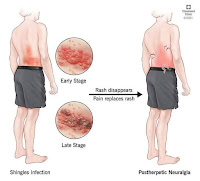Shingles infection.
Shingles is a viral infection that causes a painful rash. Although shingles can occur anywhere on your body, it most often appears as a single stripe of blisters that wraps around either the left or the right side of your chest, the back, shoulders and the stomach.while it isn't a life-threatening condition, shingles can be very painful. Vaccines can help reduce the risk of shingles, while early treatment can help shorten a shingles infection and lessen the chance of complications.
SYMPTOMS
The signs and symptoms of shingles usually affect only a small section of one side of your body. These signs and symptoms may include:
•Pain, burning, numbness or tingling
•Sensitivity to touch
•A red rash that begins a few days after the pain
•Fluid-filled blisters that break open and crust over
•Itching
Some people also experience:
•Fever
•Headache
•Sensitivity to light
•Fatigue
Most commonly, the shingles rash develops as a stripe of blisters that wraps around either the left or right side of your chest, the back, shoulders and the stomach. Sometimes the shingles rash occurs around one eye or on one side of the neck or face.
CAUSES
Shingles affects the nervesShingles is caused by the varicella-zoster virus — the same virus that causes chickenpox. Anyone who's had chickenpox may develop shingles. After you recover from chickenpox, the virus can enter your nervous system and lie dormant for years.Eventually, it may reactivate and travel along nerve pathways to your skin producing shingles. But, not everyone who's had chickenpox will develop shingles.The reason for shingles is unclear. But it may be due to lowered immunity to infections as yoou grow older. Shingles is more common in older adults and in people who have weakened immune systems.
RISK FACTORS
Anyone who has ever had chickenpox can develop shingles. Factors that may increase your risk of developing shingles include:Having HIV/AIDS: HIV weakens your immune system can increase your risk of shingles.Disease that weaken immune systems like cancer. Being older than 50Undergoing cancer treatments: Radiation or chemotherapy can lower your resistance to diseases and may trigger shingles.Taking certain medications. Drugs designed to prevent rejection of transplanted organs can increase your risk of shingles, as can prolonged use of steroids, such as prednisone.
PREVENTION
Two vaccines may help prevent shingles, the chickenpox (varicella) vaccine and the shingles (varicella-zoster) vaccine.
DIAGNOSIS
Shingles is usually diagnosed based on the history of pain on one side of your body, along with the telltale rash and blisters. Your doctor may also take a tissue scraping or culture of the blisters for examination in the laboratory.
TREATMENT Stc30 can help address for shingles , but prompt treatment with prescription antiviral drugs can speed healing and reduce your risk of complications.
WORRY
Many patients usually visit herbal homes believing that shingles is caused by one of their enemies. Shingles is a natural illness caused by the same organism that causes chicken pox. It is neither invoked by your friends or enemies and not a spiritual illness. When next you see someone having shingles. Take him to the hospital and also recommend them to try stc30 . The pain of shingles can make people to commit suicide !!!! If not handled appropriately.













♥️♥️♥️♥️❤️❤️❤️♥️❤️
ReplyDelete,alla3
ReplyDeleteOho my god
ReplyDelete🌎🌎🌍
ReplyDelete